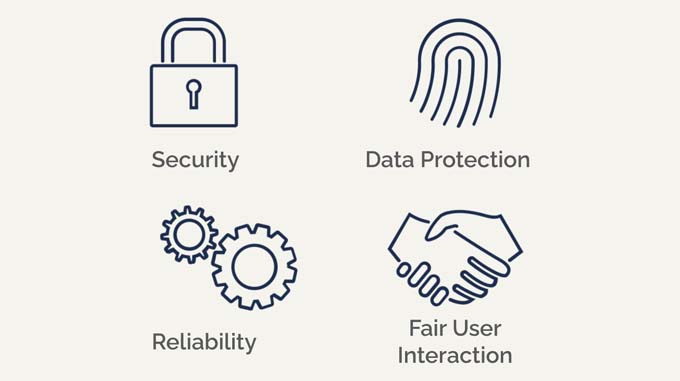A compliance culture in the crypto world?
For many, the crypto world still gives the impression of a gold rush in legal gray areas. The regular strong price fluctuations of cryptocurrencies still entail considerable risks for investors. No wonder the calls for stronger regulation and more compliance are now getting louder. Comment.

Blockchain technology and associated digital assets are opening up exciting prospects and creating a new vision of money, but at the same time there are serious challenges to existing regulatory and compliance regimes. These have made themselves felt in a number of ways. In the U.S., the Securities and Exchange Commission (SEC) has targeted Binance and Coinbase, the two most powerful exchanges in the cryptocurrency world. The SEC accuses Binance founder Changpeng Zhao of operating a "web of deceit" and brings 13 violations against him and his platform. Binance and Coinbase have made billions of dollars in investments. What triggered the SEC's investigation?
"House of Cards on Foundation of Deception".
According to the Federal Trade Commission (FTC), more than 46,000 people reported losing more than $1 billion in cryptocurrencies to various scams between January 2021 and June 2022, and that number only includes people who voluntarily shared that information with authorities. The Time.Stamped blog lists the most common crypto scams, such as business opportunities that promise to help you get rich. One common scam involves stealing your cryptocurrency from the exchange, as was the case with FTX founder Sam Bankman-Fried (SBF). Investors seem to know little about how to keep their cryptocurrencies safe. According to the Wall Street Journal, Sam Bankman-Fried "built a house of cards on a foundation of deception" while telling investors it was one of the safest buildings in the crypto world.
With respect to Binance, the SEC alleges that while Binance publicly claimed that Binance.US was a separate, independent trading platform for U.S. investors, Zhao secretly controlled the U.S. company behind the scenes. Among the products Binance.US allegedly illegally offered to its U.S. customers were commodity derivatives.
What is a free market?
Perhaps it is worth revisiting what constitutes a free market. A free market is one that is not controlled by anyone; no individual buyer or seller has the power or authority to influence prices on the exchange. They simply build on the market; therefore, large and very liquid markets are required. One issue besides willful influence by a player, founder, or manager is the size of the market. If bitcoin is independent, it should not drop by 50 % the moment Elon Musk decides to sell the bitcoins accepted and used to pre-fund Tesla orders. The market should digest large orders without influencing the price and be rock solid and liquid so that no single player can influence the price. The Bitcoin example shows that this condition of market size, liquidity and independence of players is not always met.
Compliance issues in the crypto world
Let's get back to the scams. While investor education and increased regulatory scrutiny is a must, we can also question the governance and compliance culture of crypto exchanges. The Global Investigation Review published in September 2022 notes a number of compliance issues and regulatory challenges with cryptocurrencies.
Broadly speaking, there are two main approaches that governments are taking in various combinations: (1) they are trying to fit digital assets into existing regulatory and compliance regimes (the approach that has been taken primarily at the federal level in the United States), and (2) they are creating new laws or amending existing laws to specifically address digital assets (as is the case in countries such as Switzerland and Dubai and in certain states in the United States such as New York).
CIP culture is missing in the crypto world
But what about a compliance and governance culture at the level of the exchanges themselves? An important component of a compliance culture is that employees feel comfortable raising issues and reporting violations without fear of retaliation. It also requires an internal reporting and resolution system to address issues as they arise. This means creating a culture that promotes open and transparent communication and allows employees to voice their concerns. Since cryptocurrencies claim to focus on the value of freedom and take an ecosystem approach, one might assume that this is the industry where a compliance culture can thrive. A compliance culture starts with leadership. The leader must manifest and live the compliance values. There are enough examples to show that this does not happen by itself in the crypto industry. There also seems to be a lack of clear policies, procedures and training. Where is the "speak-up" culture and continuous kaizen improvement in the crypto world? We see it in the community's commitment to the protocols, but it doesn't carry over to corporate behavior and culture.
Let's sit back and think about risk management for a moment. What does this missing link in the corporate culture, this missing compliance culture, mean for cryptocurrency risk management for investors, regulators and, of course, the crypto company itself? The risk that has already occurred for investors and companies is in the $10 billion direction. Perhaps not all, but some of these losses could have been avoided if good business practices such as ISO standards had been applied, if a good example had been set, and if a culture of compliance had been created within the company.
Sources used:
- https://globalinvestigationsreview.com/guide/the-guide-compliance/first-edition/article/compliance-issues-in-cryptocurrency
- Investors club https://emotional-agility.dg1.com/vc4diversity/pages/memberships
Author:
Karen Wendt is president of SwissFinTechLadies, a group of women actively encouraging women in the FinTech, tech and blockchain ecosystem to take more leadership positions in startups and become shareholders in tech companies. More articles and information here: https://www.presseportal.ch/de/nr/100096065









